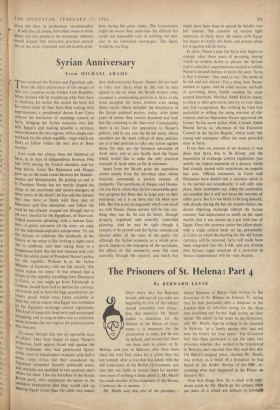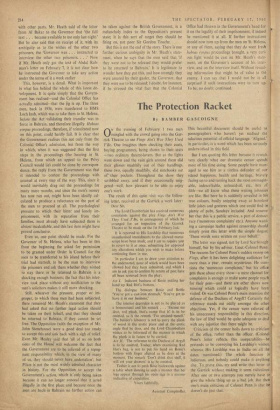The Prisoners of St. Helena: Part 4
By BERNARD LEVIN
Mr. Heath said that one of the prisoners— Abdul Rahman al Bakar—had written to the Governor of St. Helena on January 31, saying that he had previously sent a telegram to the London firm of solicitors acting for the three men declining any further legal action on their behalf. He added in his letter to the Governor, said Mr. Heath, that he wished to be returned to Bahrain, 'as a lonely person who had not seen his family' for four years.' The Governor had then been instructed to ask the other two prisoners whether they wished to be transferred to Bahrain, and reported that they said they did. (Al Bakar's original letter, claimed Mr. Heath, was written as a result of a broadcast he had heard on the Arabic Service of the BBC, re- counting what had happened in the House on January 30.) Now first things first. As is usual with state- ments made by Mr. Heath on this subject, there are parts of it which are difficult to reconcile with other parts. Mr. Heath said of the letter from Al Bakar to the Governor that 'the full text . . . became available to Me only last night.' But he also said that on receipt of it, with its ambiguity as to the wishes of the other two prisoners, the 'Governor was . . . instructed to interview the other two prisoners. . .' Now if Mr. Heath only got the text of Abdul Rah- man's letter on February 7, it is not clear how he instructed the Governor to take any action under the terms of it a week earlier This, however, is a detail. What is important is what lies behind the whole of this latest de- velopment. It is quite simply that the Govern- ment has realised—and the Colonial Office has actually admitted—that the jig is up. The three men, back in 1956, were transferred to HMS Loch Insh, which was to take them to St. Helena, before the Act validating their transfer was in force in Bahrain, and therefore illegally. Habeas corpus proceedings, therefore, if reinstituted now on this point, could hardly fail. It is clear that the Government realises this not only from the Colonial Office's admission, but from the way in which, when it was suggested that the first steps in the proceedings (the hearing in St. Helena, from which an appeal to the Privy Council would lie) could be done by correspon- dence, the reply from the Government was that it intended to contest the proceedings with counsel at every step of the way. This, since it would inevitably drag out the proceedings for many more months, and since the men's money has now run out, might have been ideally cal- culated to produce a reluctance on the part of the men to proceed at all. The psychological pressure to which their bitter and lonely im- prisonment, with its separation from their families, must already have subjected them is almost incalculable, and this last item might have proved conclusive.
Even so, one point should be made. For the Governor of St. Helena, who has been in this from the beginning (he asked for permission to be granted under Order in Council for the men to be transferred to his island before their trial had started), to be the man to interview the prisoners and ask them whether they wished to stay there or be returned to Bahrain is a shocking enough business; the fact that his inter- view took place without any notification to the men's solicitors makes it still more shocking.
Still, whatever the pressure, proper or im- proper, to which these men had been subjected, there remained Mr. Heath's statement that they had asked that no further legal action should be taken on their behalf, and that they should be returned to Bahrain, if they cannot be set free. The Opposition (with the exception of Mr. John Stonehouse) were a good deal too ready to accept this and sink back with a sigh of relief. Even Mr. Healey said that 'all of us on both sides of the House will welcome the fact that the Government are to be relieved of a repug- nant responsibility which, in the view of many of us, they should never have undertaken': but Pilate is not the most widely admired character in history. For the Opposition to accept the Government's action, which is only being taken because it can no longer conceal that it acted illegally in the first place and because once the men are back, in Bahrain no further action can be taken against the British Government, is a melancholy index to the Opposition's present state; it is this sort of target they should be firing on, not poor Sir Gordon Touche.
But this is not the end of the story. There is one further curious ambiguity in Mr. Heath's state- ment, when he says that the men said that `if they were not to be released they would prefer to be returned to Bahrain.' It is legitimate to wonder how they put this, and how strongly they were assured by their gaoler, the Governor, that they were not to be released; I doubt, for instance, if he stressed the vital fact that the Colonial Office had thrown in the Government's hand for it on the legality of their imprisonment, if indeed he mentioned it at all. If further instructions should now turn up from the men on St. Helena, or any of them, saying that they do want fresh habeas corpus proceedings brought, a very curi- ous light would be cast on Mr. Heath's state- ment, on the Governor's account of his inter- view, and on the interview itself. Without reveal- ing information that might be of value to the enemy, I can say that I would not be at all surprised if such instructions were to turn up. To be, no doubt, continued.



































 Previous page
Previous page